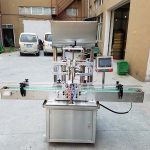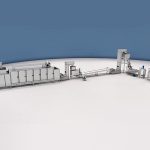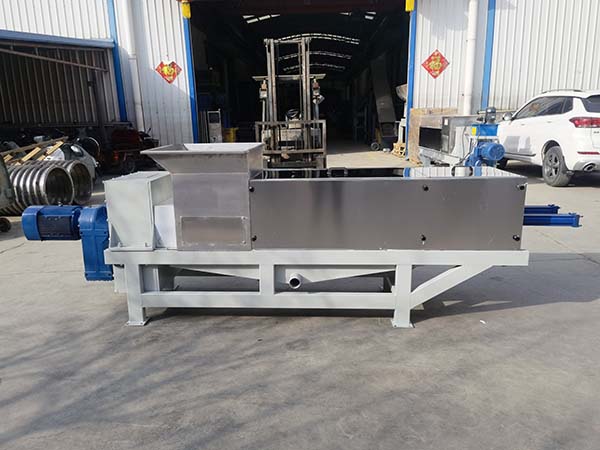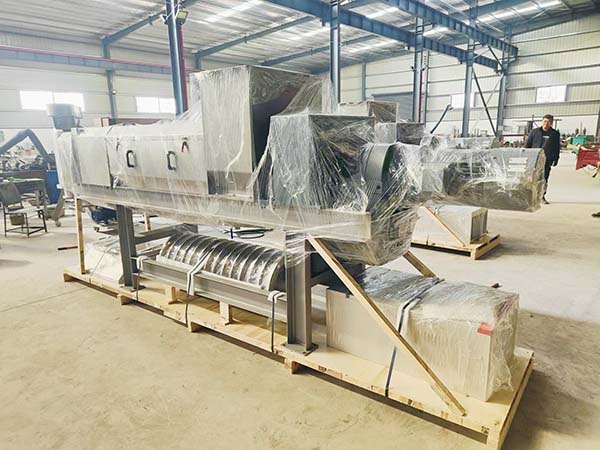
Automatic Sauce Filling Machine
02/10/2025
Batch VS Continuous Peanut Butter Processing
02/17/2025
Automatic Sauce Filling Machine
02/10/2025
Batch VS Continuous Peanut Butter Processing
02/17/2025One of the most efficient solutions for handling complex waste materials such as used diapers, cellulose fibers, and rubber, is the screw press dewatering machine. Thanks to its unique design and operational principles, the screw press machine offers remarkable advantages in dewatering efficiency, making it an essential tool in various industrial sectors.
1. Dewatering Used Diaper Waste
Material Characteristics & Dewatering Challenges:
- Complex Composition: Used diapers contain high-absorbent polymers (SAP), cellulose fibers, and plastic films. SAP forms a gel when it absorbs water, which makes it difficult to release moisture.
- High Viscosity: When wet, diapers tend to stick together, making it hard to process efficiently and often leading to blockages.
Advantages of Screw Press Machine
- High-Pressure Progressive Compression: Our screw press applies gradual pressure (0.5-3 MPa) to physically break down the gel structure of SAP, releasing water from the material.
- Anti-Stick Design: With specialized coatings on the screw blades (such as stainless steel and Teflon), the screw press minimizes material sticking, and features self-cleaning functions (e.g., reverse flushing) to prevent blockages.
- Waste Volume Reduction: The dewatering process achieves water content reduction to 50%-60% and reduces volume by over 60%, enabling effective recycling or repurposing.

Dewatering Press Machine

Tea Residue Screw Press to Sri Lanka
2. Fibrous Materials (Pulp, Plant Fibers)
Material Characteristics & Dewatering Challenges:
- Loose Fiber Structure: Centrifugal dewatering can result in fiber loss, which is undesirable when fibers are intended for recycling (e.g., papermaking).
- Need to Preserve Fiber Length: Excessive shear can reduce the quality and value of the fibers.
Screw Press Dewatering Advantages:
- Gentle Compression: The screw press operates at low speeds (0.5-10 rpm), ensuring that fibers are compressed slowly, preserving their length and integrity.
- High Dryness Output: Adjustable pressure ensures that water content is reduced to about 55%, enhancing the efficiency of subsequent drying processes.
- High Adaptability: The screw press can handle high-concentration slurry (5%-15% solid content), reducing the need for extensive pre-processing.
3. Rubber Materials (Waste Tires, Rubber Granules)
Material Characteristics & Dewatering Challenges:
- Elasticity: Rubber materials tend to rebound after compression, making it difficult to expel all moisture.
- Presence of Oil/Chemicals: Many rubber products contain oils or chemical additives that need to be separated during dewatering.
Specifical Design of Screw Press
- Continuous High-Pressure Environment: The design of the screw press, with varying diameter and pitch, ensures progressive pressure application that overcomes the elasticity of rubber, extracting both pore water and surface moisture.
- Wear-Resistant Design: The screw press is equipped with hard-wearing materials like tungsten carbide on the screw blades, ensuring long-lasting performance in high-wear environments.
Conclusion
Furui Machinery specializes in dewatering equipment for organic waste treatment, including kitchen waste, agricultural waste, animal manure, and more. With decades of experience, we have assisted hundreds of clients in their dewatering projects. The materials we handled included animal manure, food waste, spent grains, fruit and vegetable waste, wheat and corn stalks/silage, grass, sawdust, seafood waste, coconut shells, husks, and fiber, coffee grounds, tea residue, Chinese herbs, paper pulp, plastic waste, and more.
Screw press dewatering machine stands out as a powerful and versatile tool for handling different materials. With its specifical designs, it offers significant advantages for industries focused on waste reduction and resource recovery. More importantly, Furui Machinery offers custom dewatering solutions to suit specific materials.
Are you ready to improve your waste management with a screw press dewatering machine? Get in touch with us to learn how our machines can meet your unique processing needs!
